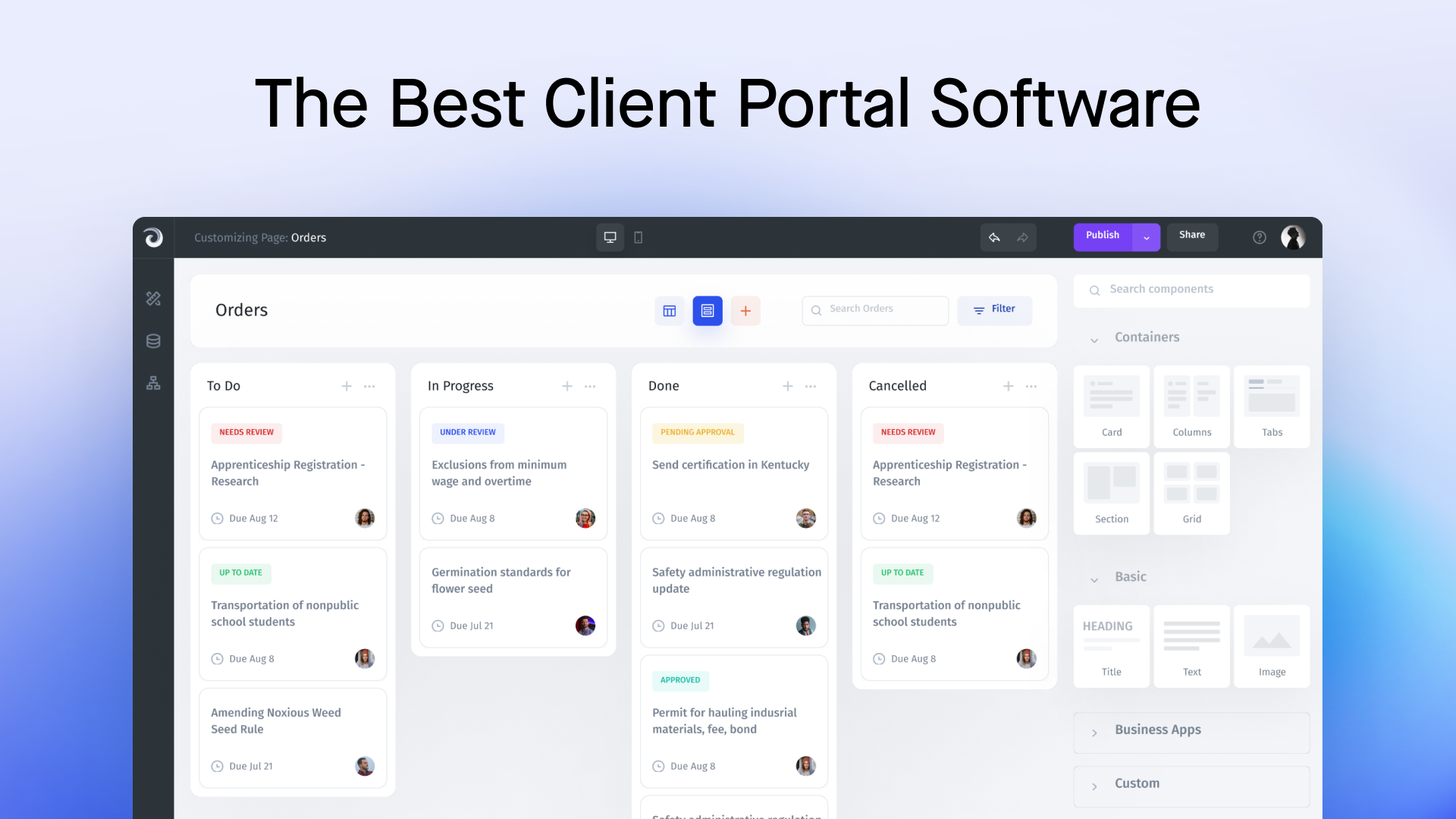With the ability of seamless communication, efficient data exchange, and enhanced collaboration with clients, client portal software has emerged as an essential tool for businesses.
The importance of implementing user-friendly and robust client portal software cannot be overstated as the digital landscape continues to evolve. This comprehensive guide aims to dive into the intricacies of client portal software, highlighting its functionalities, essential features, benefits, and best practices, focusing on the most effective strategies for optimizing client interactions and improving overall business efficiency.
What is client portal software?
Today's interconnected and fast-paced business environment requires client portal software to facilitate effective communication and information exchange between businesses and their clients. It simplifies the process of sharing documents, invoices, and other essential data while ensuring data security and confidentiality.
In developing permanent relationships between businesses and their clients, client portal software plays a pivotal role in fostering transparent communication and creating a user-friendly interface.
What should you look for in client portal software?
Understanding the key features of client portal software is crucial to evaluating its effectiveness and functionality. There are a number of essential features that should be included in a robust client portal software. Each of them plays a significant role in enhancing the client experience and improving overall business operations.
- Secure Data Encryption: Implementing advanced encryption protocols ensures the security and confidentiality of sensitive client data, protecting it from unauthorized access and potential cyber threats. In today's digital age, safeguarding data is of paramount importance. Modern client portal software goes beyond basic encryption, employing state-of-the-art security measures such as end-to-end encryption, data tokenization, and robust access control. These advanced techniques not only secure data but also instill confidence in clients, knowing that their information is well-protected.
- Customizable Interface: The ability to customize the portal's interface according to the branding and visual identity of the business fosters a personalized experience for clients, enhancing brand engagement and recognition. A well-designed, branded portal interface not only conveys professionalism but also strengthens your brand's presence in the eyes of clients. Today's client portal solutions offer extensive customization options, allowing businesses to tailor the look and feel of the platform to align with their corporate branding, colors, and logo. This level of personalization creates a seamless transition from your website to the portal, reinforcing your brand's identity.
- User-Friendly Navigation: Intuitive navigation and a well-designed interface facilitate seamless interactions, enabling clients to easily access the necessary information and navigate the platform without any complications. The user experience is a key focus in modern client portal development. The navigation menus are designed to be user-friendly, with clear labels and intuitive layouts. Responsive design ensures that the portal works smoothly on various devices, from desktop computers to smartphones and tablets. Additionally, features like a powerful search function and a well-organized document repository simplify the client's journey within the portal.
- Document Management Capabilities: Effective document management tools streamline the process of storing, organizing, and sharing documents, ensuring that clients can access relevant information quickly and conveniently. Document management has evolved to become one of the core functionalities of client portal software. These platforms offer advanced document management capabilities, including version control, collaboration tools, and document categorization. The ability to upload, organize, and share documents seamlessly within the portal ensures that clients have access to the latest information and can collaborate efficiently.
- Real-time Communication Tools: Incorporating real-time communication features, such as instant messaging and video conferencing, promotes efficient and prompt communication between businesses and their clients, facilitating quick query resolution and enhanced collaboration. Communication is at the heart of client portal software. Today's solutions include real-time chat, video conferencing, and secure messaging options. These tools enable clients and businesses to communicate seamlessly within the portal, eliminating the need for third-party communication platforms and ensuring that all interactions are logged for future reference.
- Scalability and Flexibility: A scalable and flexible platform allows businesses to adapt the software according to their evolving needs and the growing demands of their client base, ensuring seamless operations even during periods of rapid growth. Scalability is a fundamental consideration when choosing a client portal solution. Businesses require a platform that can grow with them. Modern portal software is designed to be scalable, allowing for the addition of new users, features, and functionalities as your business expands. This adaptability ensures that your portal remains a valuable asset even as your client base and services grow.
- Automated Notifications and Updates: Automated notification systems keep clients informed about important updates, deadlines, and events, enhancing transparency and enabling clients to stay engaged and informed about their ongoing projects and interactions. Automated notifications have become a cornerstone of client portal software. Clients receive timely updates about important events, upcoming deadlines, and changes in their projects. These notifications not only keep clients in the loop but also reduce the administrative burden on businesses, ensuring that everyone is on the same page.
- Comprehensive Reporting and Analytics: Robust reporting and analytics tools provide valuable insights into client interactions, usage patterns, and portal performance, empowering businesses to make data-driven decisions and optimize their client engagement strategies. Reporting and analytics have evolved to provide deeper insights into client behavior and interactions. Advanced reporting tools generate detailed analytics on client engagement, document access, and usage patterns. These insights empower businesses to refine their client engagement strategies and tailor their services to meet the specific needs and preferences of their client base.
The Best Client & Customer Portal Software in 2023
Jet Admin
Jet Admin has established itself as a leading client portal software in 2023, offering a comprehensive suite of features tailored to meet the evolving needs of businesses and their clients.
The robust software solution is widely known for its intuitive user interface, seamless navigation, and advanced security protocols, ensuring a secure and efficient platform for communication and data exchange.
Jet Admin's customizable interface allows businesses to incorporate their branding elements seamlessly, creating a personalized and immersive experience for their clients. With its efficient document management tools and real-time communication features, Jet Admin enables businesses to streamline collaboration and enhance overall productivity.
Moreover, its scalable architecture and comprehensive reporting capabilities make it a preferred choice for businesses looking to optimize their client interactions and streamline internal processes.
Key Benefits
- Intuitive User Interface: Jet Admin offers an easy-to-navigate, user-friendly interface, ensuring that businesses and their clients can effortlessly access and utilize the portal.
- Customizable Branding: Businesses can personalize the portal's interface to seamlessly integrate their own branding elements, creating a unique and immersive experience for clients.
- Document Management: Jet Admin provides efficient document management tools, making it simple to store, organize, and share documents, thus enabling clients to access information conveniently.
- Real-Time Communication: The platform incorporates real-time communication features, including messaging and collaboration tools, promoting efficient and prompt communication between businesses and clients.
- Scalability: Jet Admin's scalable architecture allows businesses to adapt the software according to their evolving needs and growing client base, ensuring seamless operations during periods of rapid growth.
- Security Protocols: Jet Admin implements advanced security measures to protect sensitive client data, ensuring data confidentiality and safeguarding against unauthorized access and potential cyber threats.
- Comprehensive Reporting: The platform offers robust reporting and analytics tools that provide valuable insights into client interactions, usage patterns, and portal performance, enabling data-driven decision-making and client engagement strategy optimization.
Pricing
Jet Admin's Customer Portal offers a range of pricing plans to suit various business needs.
Here's a summary of their pricing options:
Starter:
- Price: $39 per month
- Suitable for those getting started
- Basic features included
- No credit card required for a free trial
Plus:
- Price: $125 per month
- Advanced functionality for rapidly growing businesses
- No credit card required for a free trial
Pro:
- Price: $290 per month
- Advanced functionality for rapidly growing businesses
- No credit card required for a free trial
Enterprise:
- Price: $649 per month
- Enterprise-grade security and performance for large businesses
- No credit card required for a free trial
Usage:
- Additional users can be added for a monthly fee, starting at $50 per month for an extra 1,000 users.
Number of Apps:
- All plans include access to one app, except the PRO plan, which allows for up to three apps.
Support:
- Support options vary by plan and include self-service knowledge base, email support, and shared Slack. The Enterprise plan offers a personal customer success manager and tailored onboarding programs.
App Builder:
- Features in the App Builder category include building blocks, database integrations, data syncing, variables, business apps integration, query builder, and more.
Premium Features:
- Premium features encompass user role-based permissions, file storage (ranging from 1GB to custom amounts), custom domains, white labeling, automations/workflows, version control, custom components, and a public API.
Advanced Features:
- Advanced features include on-premise setup, single sign-on (SSO) options like SAML and Okta, a 99.9% uptime service level agreement (SLA), and advanced sign-in/sign-up customization.
These pricing plans offer flexibility to cater to a wide range of business sizes and requirements, with options for both monthly and annual billing.
Bubble
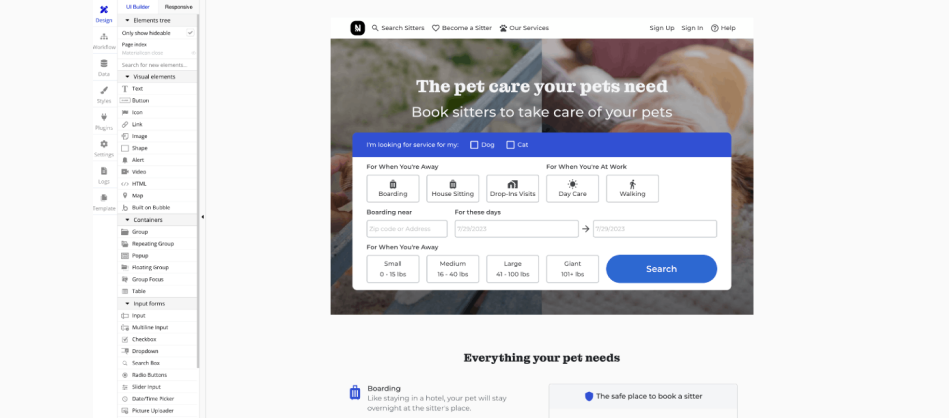
Bubble is a formidable no-code platform that empowers you to create virtually anything you can imagine, including a client portal. With Bubble, the possibilities are boundless.
However, due to its immense flexibility and scope, there is a learning curve when you first delve into Bubble's capabilities. This is why a thriving ecosystem of agencies and online courses has sprung up to help users master the tool.
Bubble's versatility means you can construct features from the ground up, including your own sign-up system and data management—all within a unified environment.
When crafting a client portal web app, you have the advantage of implementing conditions. This allows you to create responsive actions based on user interactions, such as changing the color of a component on hover. Every aspect of your web app can be customized with unique logic.
Bubble's intuitive drag-and-drop editor enables the creation of visually stunning pages without the need for HTML or CSS expertise. Plus, the platform boasts over 800 plugins to extend its functionality further.
For newcomers to Bubble, the Billing Starter Kit provides a comprehensive starting point, offering all the necessary components for building a robust client portal.
Key Features
- UX Customization: Tailor the user experience to your exact specifications.
- Data & Account Management: Easily manage data and user accounts within the platform.
- Integration Flexibility: Seamlessly integrate with a wide range of external services and systems.
- Multilingual Capabilities: Create multilingual apps to reach a global audience.
- Dynamic Content: Implement dynamic content that adapts to user interactions.
- Robust Hosting: Benefit from reliable and secure hosting for your web apps.
Pricing
All Bubble plans grant full access to the Bubble app editor and hosting. You can start building your app for free and later upgrade to access premium features and email support.
- Free: Includes core platform features, Bubble branding, and community support.
- Starter: Offers core platform features, API access, custom domain support, and email support. Starts from $32 per month (if paid annually).
- Growth: Provides 3 units of server capacity, 2 application editors, 2 development versions, and more. Starts from $119 per month (if paid annually).
- Team: Offers 10 units of server capacity, 15 application editors, 20 development versions, and additional advanced features. Starts from $349 per month (if paid annually).
Softr
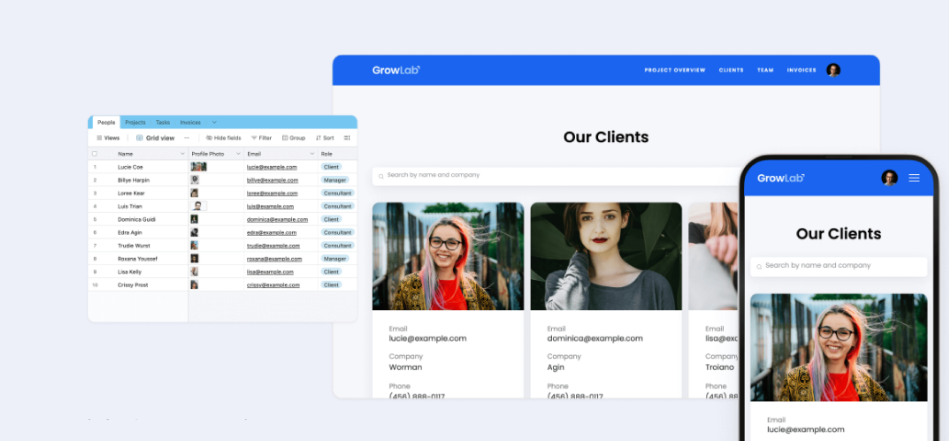
Softr stands as a no-code custom app builder with a unique focus on harnessing Airtable and Google Sheets data to create client portals, partner portals, and internal tools tailored to your specific needs.
What sets Softr apart is its approach—you don't receive a rigid, pre-defined client portal. Instead, you build it from the ground up, crafting it to precisely align with your business requirements. The software's versatility extends beyond client portals, offering the potential to expand into additional solutions as your business evolves, such as a sales CRM portal or online marketplace.
Key Features
- Template-Based Customization: Start from feature-rich templates for client portals, employee intranet portals, and sales CRM platforms, then tailor them to your requirements.
- Secure Data Handling: Softr employs server-side authentication powered by AWS for top-tier data protection, performance, scalability, and availability.
- Members-Only Access: Control access to specific pages or sections based on user roles, company affiliation, and payment rules.
- Custom Form Builder: Easily create custom forms with various field types, and seamlessly integrate responses with platforms like Airtable using Zapier or Integromat.
- Secure Payments: Facilitate both recurring and one-time payments, and apply codes or coupons at checkout.
- Customer Support: Softr offers a wealth of resources, including guides, articles, videos, and seven-days-a-week live chat support to assist with any challenges.
Pricing
Softr offers a free plan, perfect for those just starting. For more advanced features, consider the following options:
- Basic: Ideal for individuals and startups building data-driven apps, priced at $49 per month (billed annually).
- Professional: Designed for companies needing custom apps with advanced features, available at $139 per month (billed annually).
- Business: Tailored for teams and companies in need of robust portals and internal tools, priced at $269 per month (billed annually).
Stacker
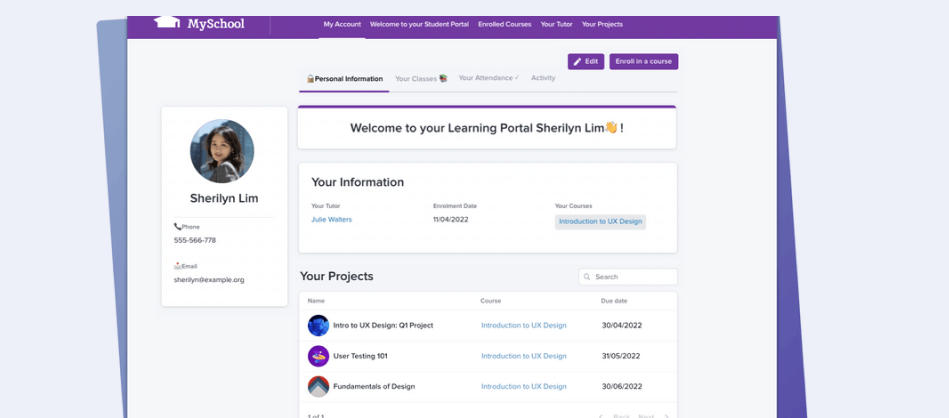
Stacker is a no-code solution for constructing not only client portals but also an array of other applications, including internal tools, partner apps, and custom CRMs.
What distinguishes Stacker is its focused functionality, which some consider an advantage while others may perceive it as a limitation. The verdict depends on your specific requirements. Stacker enables you to integrate data from sources like Airtable, Google Sheets, and Salesforce.
Before sharing your web app, ensure you personalize the branding to align with your business identity. Once ready, you can effortlessly share the application with other members, granting them the ability to view and edit their own records. Any changes they make to the data will automatically update in your data source.
Key Features
- Customizable UI & Branding: Tailor the user interface and branding to reflect your unique identity.
- Data Integration: Easily link and sync data from Airtable, Google Sheets, and Salesforce.
- User Authentication: Implement user authentication for secure access control.
- Collaborative Work: Enable collaborative work on your applications, allowing multiple users to interact seamlessly.
Pricing
All Stacker plans offer unlimited external users and community support. Choose from the following plans to match your needs:
- Starter: Priced at $59 per month, this plan includes one app, 10,000 records, and more.
- Plus: Available for $149 per month, this plan provides access to three apps, unlimited records, and allows for three collaborators, among other features.
- Pro: Priced at $290 per month, the Pro plan offers unlimited apps and permits up to 10 collaborators, along with additional features.
- Enterprise: For those with extensive requirements, the Enterprise plan offers unlimited workspaces, white labeling, and more, tailored to your specific needs.
Zoho Creator
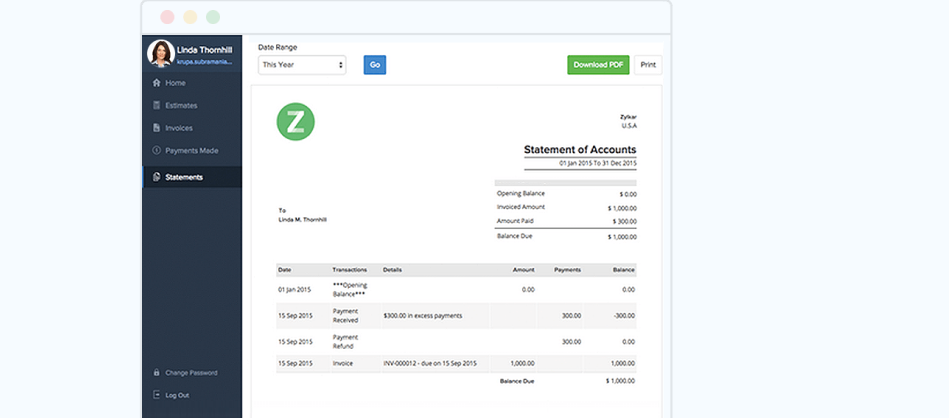
Zoho Creator stands as a powerful low-code application development platform, empowering users to craft, create, and deploy various business software, including the development of customer portals.
Key Benefits
- Efficient Data Organization: Zoho Creator simplifies the process of organizing client data and offers the flexibility to fine-tune user permissions according to your specific requirements.
- Stand-out Features:
- Multiplatform Accessibility: Users and team members can access Zoho Creator portals effortlessly on both computers and mobile devices, ensuring seamless connectivity. You can also engage customers through web, email, and mobile push notifications.
- Streamlined User Management: Manage portal users with ease by adding them individually or in bulk. Categorize them based on approval status, and employ dynamic user additions using scripts.
- Robust Authentication Options: Choose from multiple authentication mechanisms, including single sign-on (SSO) with third-party identity providers or federated logins via platforms like Google and Facebook.
- Customized Notifications: Enhance user communication with personalized email notifications, tailored to your audience's specific preferences.
Pricing
Zoho Creator offers a 15-day free trial to get you started, after which you can opt for one of the following plans:
- Professional Plan: Ideal for businesses with multiple software needs, this plan supports up to five applications and provides flexibility in user count. It's priced at $25 per month (billed annually).
- Ultimate Plan: Tailored for large organizations with intricate software requirements, this plan offers unlimited apps and records, priced at $400 per month (billed annually).
Benefits of Implementing Client Portal Software
The integration of client portal software into business operations offers a multitude of benefits, contributing to improved efficiency, enhanced client satisfaction, and streamlined communication. Some of the key benefits include:
1. Enhanced Operational Efficiency: By providing clients with self-service options and effectively handling routine tasks and queries, businesses can optimize their operational efficiency and reduce the workload on their customer support teams, allowing them to focus on more complex client issues and strategic initiatives.
2. Strengthened Client Relationships: The implementation of client portal software fosters stronger and more transparent client relationships by providing a centralized platform for communication and data exchange, building trust and credibility between businesses and their clients.
3. Improved Data Security Measures: Robust data security measures safeguard sensitive client information, protecting it from potential cyber threats and ensuring compliance with data protection regulations, thereby enhancing clients' confidence in the security of their data.
4. Streamlined Collaboration Processes: The collaborative nature of client portal software enables seamless collaboration between businesses and their clients, facilitating efficient document sharing, project management, and collaborative discussions, thereby enhancing overall productivity and teamwork.
5. Facilitated Access to Information: With a centralized repository for documents, invoices, and other essential data, client portal software provides clients with convenient access to information, enabling informed decision-making and enhancing the overall client experience.
6. Increased Transparency and Accountability: Transparent communication and accessible data within the client portal software foster increased transparency and accountability, enabling clients to stay informed about project updates, milestones, and other critical information, fostering a sense of trust and reliability.
Optimizing Client Interaction with Effective Portal Software Strategies
Implementing an effective client portal software strategy is essential for maximizing its potential and ensuring seamless interactions between businesses and their clients. Some strategies to optimize client interaction include:
1. Personalized Client Experiences: Tailor the client portal software to provide personalized experiences, offering customized recommendations, and personalized content based on clients' preferences and past interactions with the platform.
2. Proactive Client Support: Implement proactive client support initiatives, such as automated reminders and notifications, to keep clients informed about upcoming deadlines, events, and important updates, ensuring timely and effective client engagement.
3. Interactive Training and Resources: Provide interactive training materials and resources within the client portal software to educate clients about the platform's features and functionalities, enabling them to utilize the software effectively and independently.
4. Seamless Integration with Business Processes: Integrate the client portal software seamlessly with existing business processes and systems, ensuring that it complements the overall workflow and enhances operational efficiency without causing any disruptions.
5. Regular Client Feedback and Surveys: Collect regular client feedback and conduct surveys within the client portal software to gain insights into client preferences, needs, and pain points, enabling businesses to make data-driven improvements and optimize the overall client experience.
6. Continuous Software Updates and Maintenance: Regularly update and maintain the client portal software to ensure that it remains secure, functional, and aligned with the evolving needs and technological advancements in the industry, providing clients with a seamless and up-to-date user experience.
The Future of Client Portal Software: Trends and Predictions
Looking ahead, the future of client portal software is expected to witness significant advancements and innovations driven by emerging technologies and changing client expectations. Some of the anticipated trends and predictions for the future of client portal software include:
1. Enhanced AI Integration: The integration of advanced artificial intelligence (AI) capabilities within client portal software is expected to revolutionize client interactions, enabling businesses to offer personalized recommendations, automate processes, and provide intelligent insights to clients.
2. Blockchain for Enhanced Security: The adoption of blockchain technology for enhanced data security and transparency within client portal software is expected to become increasingly prevalent, enabling businesses to build trust and credibility by ensuring the integrity and immutability of client data.
3. Augmented Reality (AR) for Enhanced Engagement: The integration of augmented reality (AR) features within client portal software is expected to enhance client engagement and user experience, allowing clients to visualize products and services in a more interactive and immersive manner.
4. Integration of Voice Recognition Technology: The integration of voice recognition technology within client portal software is expected to streamline client interactions, enabling clients to navigate the platform and access information through voice commands, enhancing accessibility and user convenience.
5. Focus on Predictive Analytics: The adoption of predictive analytics tools within client portal software is expected to enable businesses to anticipate client needs and preferences more accurately, enabling them to offer personalized recommendations and tailored solutions in real-time.
6. Emphasis on Data Privacy and Compliance: The increasing emphasis on data privacy and compliance regulations is expected to drive the implementation of more stringent data protection measures within client portal software, ensuring that businesses adhere to the highest standards of data security and privacy.
How toChoose The Right Client Portal Software?
Implementing an effective client portal software strategy requires a systematic and well-planned approach that takes into account the specific needs and requirements of the business, as well as the preferences and expectations of the client base. Some key steps to consider when implementing a client portal software strategy include:
1. Conducting a Comprehensive Business Analysis: Conduct a comprehensive analysis of the business processes, client interactions, and existing communication channels to identify the specific areas where client portal software can add value and streamline operations.
2. Defining Clear Objectives and Key Performance Indicators (KPIs): Define clear objectives and key performance indicators (KPIs) to measure the success and effectiveness of the client portal software strategy, ensuring that it aligns with the broader business goals and objectives.
3. Selecting the Right Client Portal Software Solution: Conduct thorough research and evaluate various client portal software solutions available in the market, considering factors such as security features, customization options, user-friendliness, and scalability, to select the most suitable solution for the business.
4. Customizing the Client Portal Software to Align with Business Needs: Customize the client portal software to align with the specific requirements and branding of the business, ensuring that it reflects the business's values, vision, and unique selling propositions to create a cohesive and immersive client experience.
5. Training and Onboarding Clients and Employees: Provide comprehensive training and onboarding sessions to both clients and employees to ensure that they understand the functionalities and features of the client portal software, empowering them to utilize the platform effectively and independently.
Wonder how to simplify your onboarding journey? Try Jet's Onboarding Tool Template!
6. Monitoring and Continuous Improvement: Continuously monitor the performance of the client portal software, collect client feedback, and conduct regular assessments to identify areas for improvement and optimization, ensuring that the software remains up-to-date, secure, and aligned with the evolving needs and preferences of the client base.
Conclusion: Leveraging Client Portal Software for Business Success
In conclusion, the integration of robust and user-friendly client portal software is essential for businesses seeking to enhance client interactions, streamline communication, and foster long-lasting client relationships. By prioritizing features such as data security, user-friendliness, customization options, and scalability, businesses can leverage client portal software to optimize their operational efficiency, strengthen client relationships, and stay ahead of the competition in an increasingly digital business landscape.
By adopting effective client portal software strategies and staying attuned to the latest trends and advancements in the industry, businesses can position themselves for sustained growth, success, and client satisfaction in the years to come.
Try Jet’s customer portal builder today to create your unique solution tailored to your business needs.
FAQ
What is included in a customer portal?
A customer portal typically includes features like user authentication, document sharing, communication tools, self-service resources, service requests, order and payment management, analytics, integration capabilities, and robust security to enhance the interaction between a business and its customers.
How do I create a portal for my business?
To create a customer portal for your business, start by defining your objectives and choosing suitable software. Design a user-friendly interface, implement secure user authentication, select and integrate the necessary features, and thoroughly test the portal for functionality and security. Provide user training and support, then launch and promote it to your customers. Continuously gather feedback for improvements.
